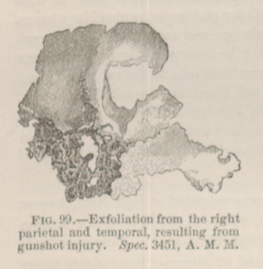Title: Fisher, William
Source text: Surgeon General Joseph K. Barnes, United States Army, The Medical and Surgical History of the War of the Rebellion. (1861–65.), Part 1, Volume 2 (Washington, D.C.: Government Printing Office, 1870), 188.
Civil War Washington ID: med.d1e13547
TEI/XML: med.d1e13547.xml
CASE.—Private William Fisher, Co. G, 98th Pennsylvania Volunteers, was wounded near Fort Stevens, Washington, July 12th, 1864, and was admitted into Mount Pleasant Hospital on the following day. A little above the right ear was a scalp wound an inch and a half long. Acting Assistant Surgeon P. C. Porter, under whose care the patient came, satisfied himself that a piece of the mastoid process was chipped off, and that a fracture extended into the petrous portion of the temporal. From the aspect of the wound, Dr. Porter was inclined to the belief that it was inflicted by a conoidal musket ball. The patient did well with simple dressings, and rest, and gentle cathartics, till the 20th of July, when the wound began to slough. Applications of charcoal and yeast poultices, nitric acid, and creasote, failed to arrest the sloughing, which presently gave rise to repeated hæmorrhages from branches of the temporal artery. The gangrene continued to spread until August 9th, when the eschars separated, leaving a space five inches in diameter on the right side of the head, denuded of integument, fascia, and muscles. During this long period, the patient complained of no inconvenience at the seat of fracture, though there was at times acute frontal pain. Early in September, it was evident that the exposed portions of the temporal and parietal bones were necrosed, and on September 6th, a fragment of the squamous portion of the temporal was removed. Two days subsequently other fragments were detached and extracted. After this the wound began to cicatrize rapidly, and on December 3d, 1864, the patient was reported to be entirely out of danger, and in fact nearly well. On February 14th, 1865, he was discharged from service on a certificate of disability signed by Surgeon H. Allen, U. S. A. He was pensioned. In 1865, he was reported as partially deaf. He was last paid at the Philadelphia Agency, September 4th, 1870, and his pension had been reduced, from which it may be inferred that the examining surgeon regarded his disabilities as comparatively slight.
